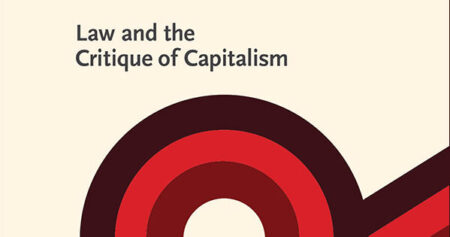Traditional interpretations of the Genocide Convention construe the crime of genocide in notoriously limited terms. By contrast, South Africa’s genocide case against Israel at the International Court of Justice offered a more expansive perspective. This case should be seen, in part, as an effort to construct a historically-grounded and political economy-informed understanding of genocidal violence that nevertheless remains within the framework of the Convention and retains its legibility to a court of law.
The idea that LPE is lacking in legal theory, as Sam Moyn has recently claimed, depends on what counts as legal theory. If we take Legal Theory to be a subject that is defined by the Marxism-related anxieties of CLS, then LPE work is severely under-theorised. If, instead, we endorse an idea of legal theory without capitalisation - a way of writing about law that is explicit and explanatory about our assumptions - then many LPE scholars have been analytically generous in presenting their understanding of law and political economy, even if more remains to be done.
Humanitarian concerns have generally failed to bring about concrete legal limits on the use of sanctions as a tool of foreign policy. However, as the ongoing saga concerning the Afghan central bank’s assets indicates, they have succeeded in something much more fundamental: they have legitimized the use of sanctions as a tool for undoing and re-assembling the sovereignty of a postcolonial state.
To what extent do the very building blocks of international law enable the weaponization of economic asymmetry? How has the expansion of the U.S. financial system shifted the locus of economic coercion in the global order? And what possibilities exist for legal analysis and advocacy to contest such forms of imperialism? To answer these and other questions about the role of law in economic sanctions, this symposium draws together insights from scholars working at the intersection of LPE and Third World Approaches to International Law (TWAIL).
International law has a thriving critical scene, arguably bigger and more institutionally established than any other field. Yet political economy has been an unstable point of focus for critical international lawyers, in part because the justifications of the status quo in the international domain never coalesced into anything akin to a ‘21st-century synthesis.’ This picture of fragmentation and instability helps explain why Marxism provides a useful set of intellectual tools for approaching law, in particular, and social formations in general.
This post is part of our symposium on Quinn Slobodian’s Globalists: The End of Empire and the Birth of Neoliberalism. Read the rest of the symposium here. ‘We are all internationalists now, whether we like it or not’, proclaimed Tony Blair in 1999, possibly the high-point of (neo)liberal internationalism. In his masterful Globalists, Quinn Slobodian reconstructs…




